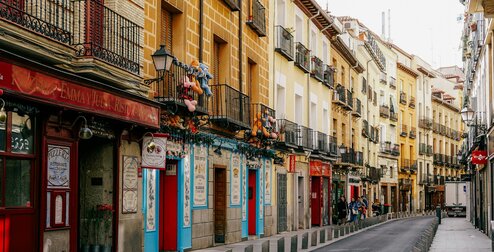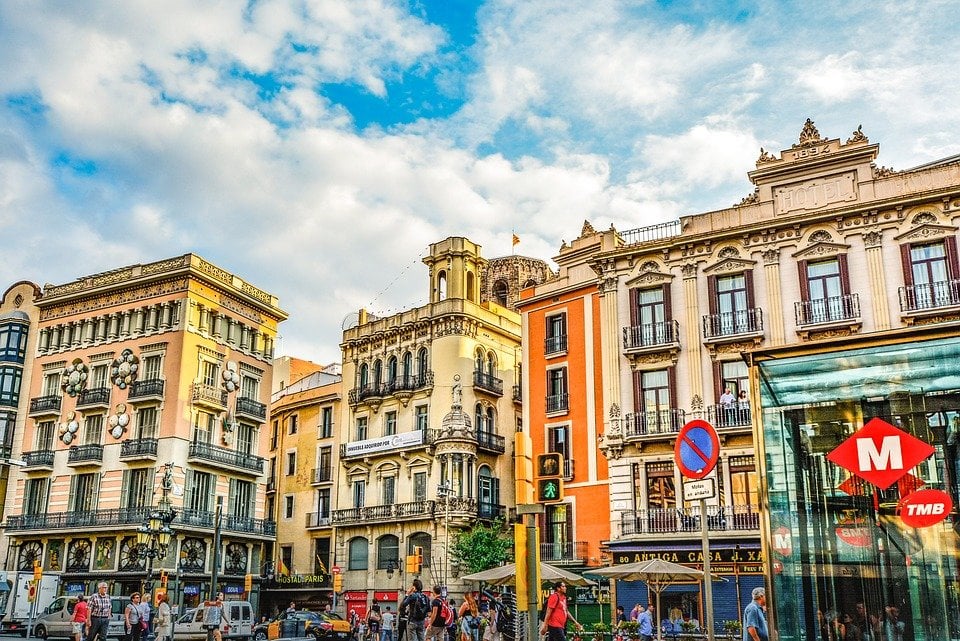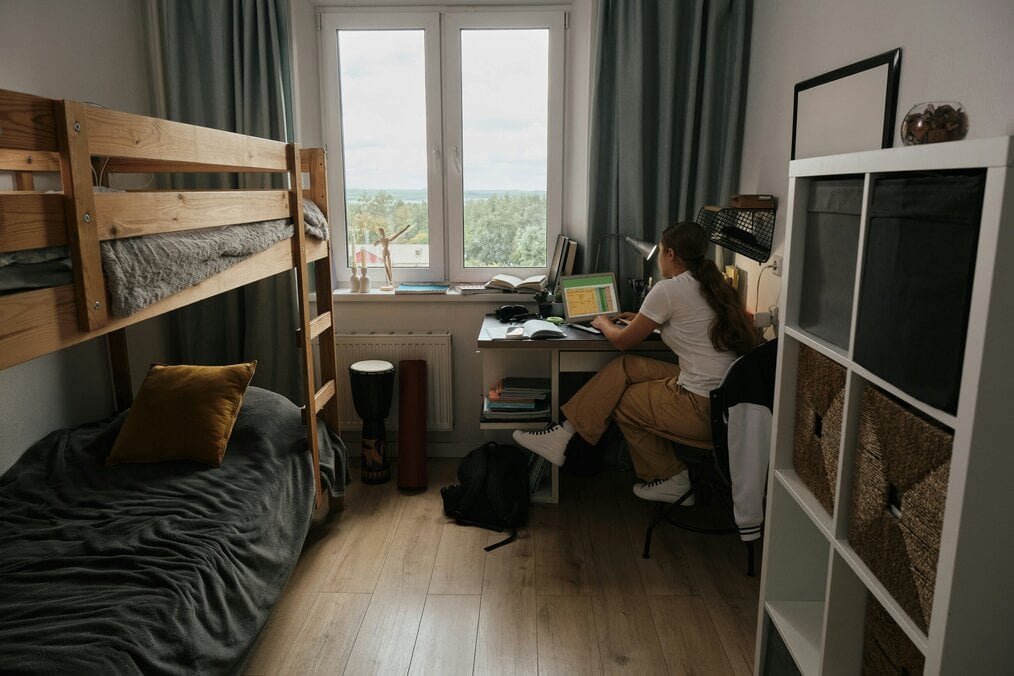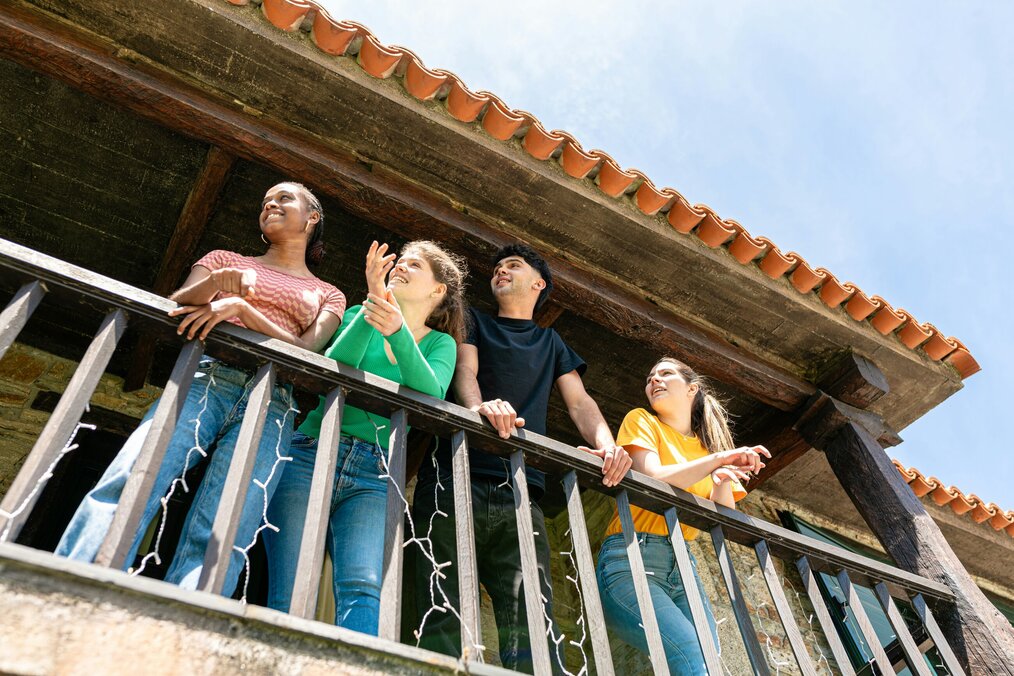
How to Find Student Housing in Spain
Explore our step-by-step guide to finding housing in Spain as an international student.
You’re headed to Spain to study, teach, or intern and there’s a big question on your mind: How do I find student accommodation in Spain? If housing isn’t included with your program, there are thankfully a lot of options to explore.
Whether you are a study abroad student, language student, or auxiliar de conversación (English language assistant), this guide will help you understand how to rent an apartment as an international student in Spain.
1. Research your options
Before you get on the plane, start your research. Getting there with specifics in mind will help you save time and better yet, get ahead in the housing search! Searching for student housing in Madrid and Barcelona and other major cities during peak times (beginning of academic semesters or teaching seasons) can resemble The Hunger Games. Being prepared ahead of time is key!
Factors to consider
When starting your research, focusing on these things can help make the process less overwhelming.
- Neighborhoods: Do you want to live in a lively area close to bars and restaurants or someplace quieter and more residential? Neighborhoods in Spanish cities have distinct personalities and price ranges. Figure out which ones match your own vibe and budget and start there.
- Transport links: Public transportation in most Spanish cities is miles better than most places in the US. Urban centers tend to be very well-connected which makes getting around without a car simple. If you need to commute daily to school or work, consider living in a neighborhood on that transit line (bus, metro, train) to make things easier for yourself.
- Distance from campus: Aside from classes, if you want to get involved in campus life, you may want to live closer to the university. Being within walking distance also helps you avoid the morning and evening rush hours on public transport.
- Amenities: Lugging heavy groceries long distances on foot or on a crowded metro can be a drag. When you look at potential neighborhoods or apartments, it’s helpful to make sure things like grocery stores, pharmacies, and restaurants are close by.
Understand the types of student housing
There are many different types of student housing available in Spain. The larger the city, the more options you’ll have. However, most cities with a major university have a good choice of accommodation for international students.
Some of the options you’ll find are:
- University residence halls: Not all universities in Spain have their own dorms or off-campus residence halls but make sure to inquire with your university to see if renting a room through them is possible. Some include access to a dining hall.
- Shared accommodation: Most students share a flat, either with other students or local working adults. Usually, the existing roommates will post an ad on a housing site.
- Student flats: Companies that cater specifically to students own apartments located around the city and rent them on a temporary basis. Often, you can secure a room before you arrive in the country.
- Homestays: If you study abroad through a third-party program provider, they may be able to arrange a homestay with a local family. Homestays tend to be more expensive but they provide you with meals and the chance to integrate with a Spanish family (and improve your language skills!).
- Renting on your own: Older or more independent students may wish to live alone and rent an entire studio or apartment to themselves. This will entail searching for listings and contacting landlords directly.
To compare, here’s a rough overview of housing prices (in USD) in popular student cities in Spain.
| Housing type | Madrid | Barcelona | Seville | Valencia |
|---|---|---|---|---|
| University dorm | $600-$900 | $1,500-$2,000 | $650-$850 | $700-$900 |
| Room in shared apartment | $400-$550 | $550-$800 | $250-$400 | $300-$500 |
| Student residences | $350-$500 | $430-$700 | $200-$350 | $300-$400 |
| Homestay | $1,000-$1,500 | $1,200-$1,600 | $600-$800 | $700-$900 |
| Studio/1 BR | $800-$1,300 | $900-$1,600 | $550-$1,250 | $500-$1,000 |
2. Begin your search

Once you’re in Spain, it’s usually best to stay at temporary accommodation like a hostel, Airbnb, or hotel while you search for a place. Unless the website is specifically for international student housing and is a trusted provider, never pay a deposit or send any money before you see the place. There are unfortunately scams out there that target unsuspecting students.
Best sites for finding international student accommodation in Spain
Some trusted sites for finding student housing in Spain include:
- Pisocompatido: A commonly used site for finding rooms in shared apartments.
- Idealista: Popular site for finding private apartments and studios. They also have a search feature to find roommate listings.
- Student.com: Secure your room before your arrival by paying online. You can search by your university to find places nearby.
- Uniplaces: Caters to students and offers shared and private apartments. You can’t visit the property first but there is a 24-hour period after you move in to get a refund if the apartment is not as advertised.
- Spotahome: Find entire apartments as well as rooms and secure them in advance. Spotahome doesn’t allow visits but has guarantees for your initial move-in and deposit.
- HousingAnywhere: Another website that allows you to book before arrival in Spain, HousingAnywhere has move-in tenant protection should any issues arise.
- Flatio: Book online before you arrive, without a deposit. All utilities are included in the price for apartments listed on Flatio.
Top tips for the search
Finding the right student housing in Spain takes time and perseverance. Here are some tips to help you in your search.
- Be on the lookout for fake listings. If it seems too good to be true, it probably is! This is why research is important. It helps you understand the average rent you’ll pay and what kind of apartment to expect for the price. For example, if you see a beautifully renovated 1-bedroom in the Malasaña neighborhood of Madrid for 600 euros, chances are the listing is fake.
- Set up alerts on housing websites. On most sites, you can define a search criteria for apartments (price range, neighborhood, etc.) and opt in to receive alerts as soon as a new place is listed. Contact any leads immediately for the best chance of securing a viewing!
- Always view the apartment. Unless it’s a company like Uniplaces or Spotahome that doesn’t allow you to view the apartment first, you should always go and check it out before handing over any money.
- Text or call. People who list apartments or rooms on sites like Idealista rarely answer emails. If there’s a number listed, text or call it. Most people in Spain use Whatsapp and you’ll have more luck connecting with the person directly. If you don’t speak Spanish, Google translate can help. Unless it’s a student housing site, private landlords may not respond to messages in English.
- Don’t take the first place you see. When it’s hard to get viewings set up, you may feel pressured to take the first place you see in case that’s the only opportunity you have. It won’t be! If your first viewing doesn’t tick most of your boxes or the roommate or landlord vibe is off, don’t sign a lease. You want to be happy in your home for the time you’re there.
- Don’t get discouraged. It can be very competitive to find a place to live in big cities like Madrid and Barcelona but keep at it. Send out multiple viewing requests a day. Not all of them will get a reply but you increase your chances of scheduling a tour the more lines you throw in the water.
3. Sign your lease
You’ll want to make sure you sign a lease so you have a legally binding agreement to protect your rights as a tenant. The lease will define the length of time you’re renting as well as any rules. Make sure you read the lease well. If you don’t speak Spanish, have a friend or professor check it out for you.
Do a bit of research on rental law in Spain. New laws have been passed in recent years that cover things like how much a landlord can charge for a deposit as well as who pays the fee to the "agencias" (hint: it’s no longer the tenant). Some landlords may try to take advantage of foreigners and students who may not know the law.
4. Move in and get settled

Now that you’ve found your new place, it’s time to move in and get comfortable! Here are a few tips to do it right.
Complete a move-in checklist
As soon as you arrive, check for damage around the apartment or room. You’ll also want to take note of any furniture and home goods present. Photograph everything and send the pictures of any damage as well as your list of items to the landlord by email right away. This will help ensure you aren’t magically charged for the hole that was already in the wall or the TV that never worked when you move out.
Get to know your roommates
Living with other people can be both fantastic and hard. To make sure you get off on the right foot with new roommates, make an effort to introduce yourself and get to know them. Agree on any house rules and define the chore rotation at the beginning. In Spain, it’s inexpensive to hire a cleaner so people living in shared houses often have one come weekly and split the cost.
Common disagreements among roommates about cleaning and guests can be avoided if you maintain open communication and make sure everyone is on the same page. Also be aware that cultural differences among roommates can contribute to miscommunications so it’s important to be open-minded and flexible as you navigate the new experience. More than likely, your new roommates will turn into friends for life!
Buy the essentials
Most rentals, especially student accommodation, in Spain come furnished with things like sofas, beds, desks, and basic kitchenware. You will usually need to buy bedding, towels, and other bits and bobs once you move in.
Some popular places to buy affordable home goods include:
- Primark: Known as Penney’s in Ireland where it was founded, Primark is famous for their fast fashion. They also sell affordable home furnishings, duvets, pillows, and bedding.
- Hipermercados Carrefour: Carrefour is a French grocery store chain that also has superstores selling a range of products for the home.
- Bazaars: Independently owned shops selling everything from dishes to tools to school supplies. Think: corner store mixed with a Walmart.
- El Corte Inglés: A huge Spanish department store where you can buy just about anything. Tends to be pricier than other options but there are often deals, especially during rebajas, the sale seasons.
- IKEA: You can find IKEA all over Spain and it’s just as glorious as it is in your home country.
Helpful things to know about housing in Spain

The ins and outs of Spanish housing can be confusing at first if you’re not acquainted with some of the terminology and rules. Here are some of the most helpful tips.
- Apartments are listed as interior or exterior. In interior apartments, any windows face an interior courtyard. How quiet these are depends on your neighbors! Exterior apartments have windows that face the street. While these apartments can be noisier due to traffic sounds and nearby bars and restaurants, they are usually brighter.
- Buildings in Spain start on floor zero. If your piso is on the 4th floor without an elevator, prepare to get a workout!
- You may have a concierge. If your building has a portero/a, there will be someone who works at the front desk to accept packages for you and generally oversees the upkeep of the building. A portero electrónico, on the other hand, is the intercom system that allows you to talk to the person ringing the bell downstairs and to buzz them in.
- There are different places for trash and recycling. Your trash should be put in the wheelie bin outside your building at night but recycling must be taken separately to receptacles on the streets. The color coding may depend on the city but usually, glass is green, plastic is yellow, and paper is blue/gray.
- Most cities in Spain have noise ordinances. The schedules vary by city but generally, if you’re playing loud music or partying in your apartment after 10 pm, the neighbors can call the police and have you fined. Be a respectful neighbor and take the parties to the fabulous bars and clubs!
Find your new home in Spain
Spain is a wonderful place to study, teach, or intern. Its cities are filled with charm and plenty of opportunities to learn about Spanish culture and food. Finding the perfect place to live during your time in Spain will definitely be the cherry on top of an already amazing experience. Take your time and choose wisely!
Read more about studying in Spain:






